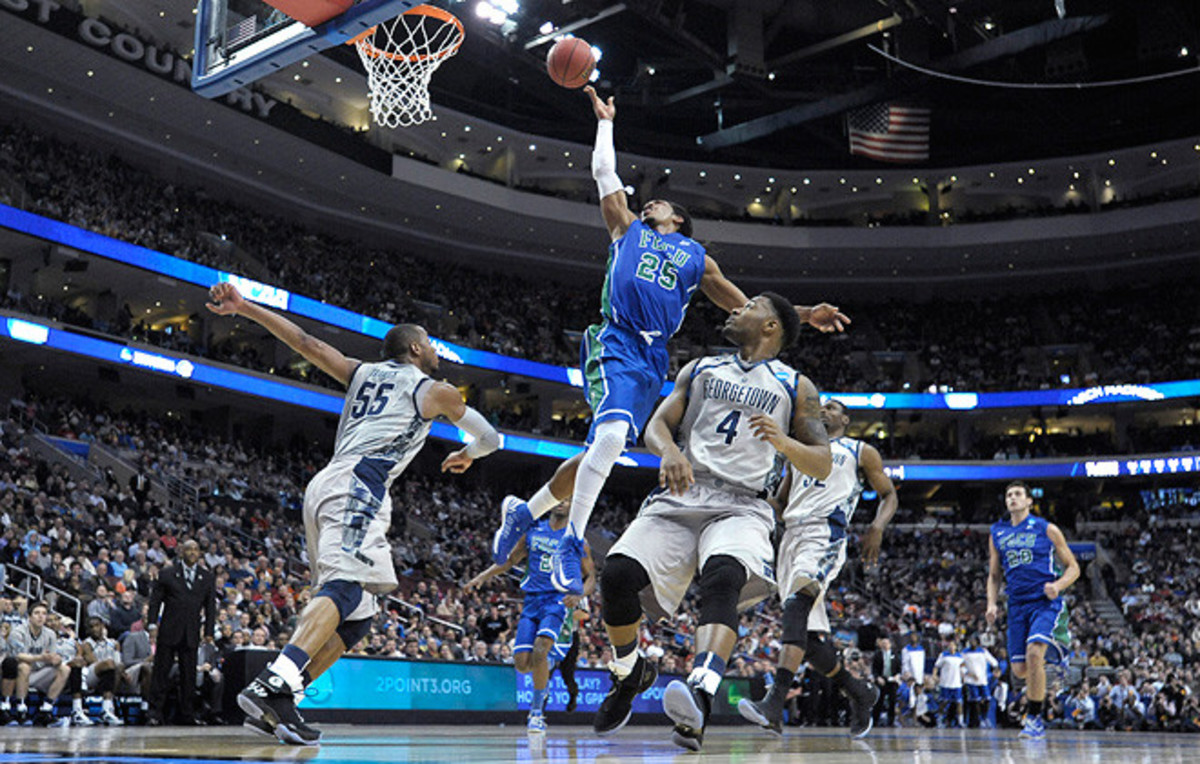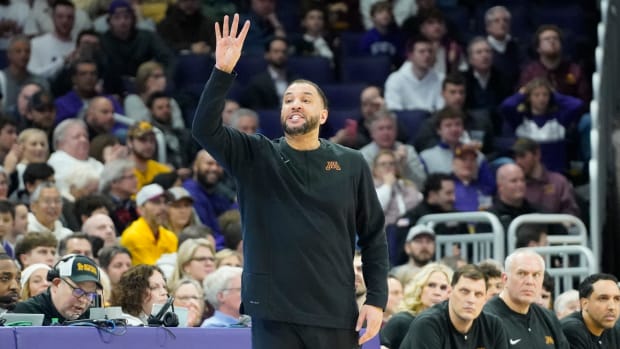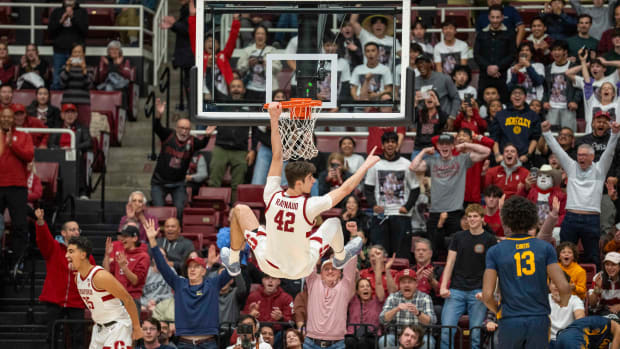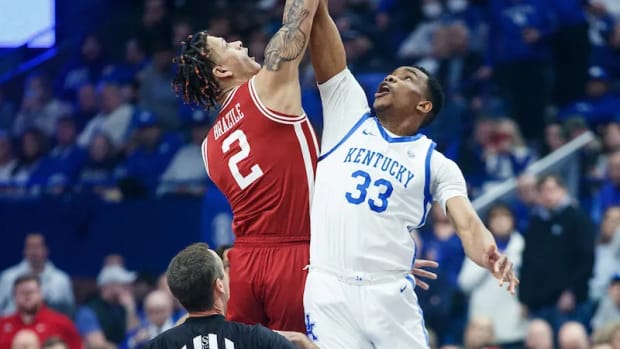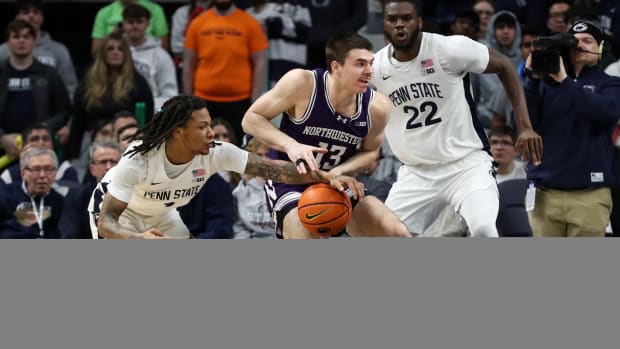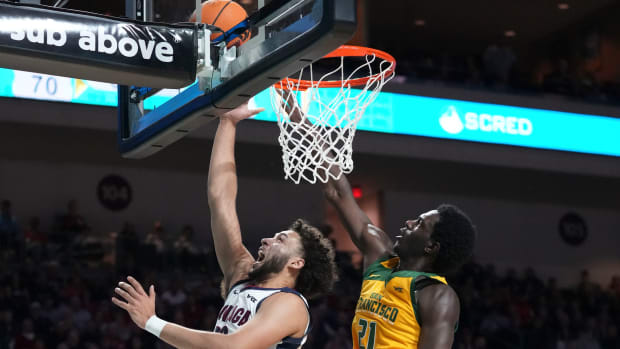Don't blame the refs, my picks for the Sweet 16, more Hoop Thoughts
You remember life, liberty and the pursuit of happiness? Well, if you've watched much college basketball this season, you've seen a lot of diagrammed plays, manifold timeouts, and 34-and-a-half-second offensive possessions. Too many coaches these days run their teams as if they believe freedom is a four-letter word. It's oppressive.
On the one hand, I can sympathize. These men work in a profession where you can take your team to three straight Final Fours and still get a pink slip. Coaching already attracts domineering Alpha male control freaks as it is. The marketplace demands perfection, so they do not want their players to make mistakes.
Then along comes this merry little band of Eagles from Fort Myers, Fla., and suddenly the sport is soaring again. The players from Florida Gulf Coast are carefree, having fun, and never met an alley-oop they didn't like -- and oh by the way, they just became the first No. 15 seed in the history of the NCAA tournament to reach the Sweet 16. Not a coincidence. This isn't darling little Princeton holding the ball and back-dooring its way through the bracket. This is a high-flying, run-and-gunning dunk-a-thon that is as effective as it is entertaining. Florida Gulf Coast has become America's Team by embodying the American Dream. They went to Philadelphia and showed off their freedom.
We've been inundated the past few months with lots of wonderful retrospectives on the 75th year of the NCAA tournament, and it's a sure bet that 25 years from now, the 100-year specials will include the immortal alley-oop from FGCU point guard Brett Comer to Chase Fieler toward the end of the Georgetown win. It was a nice play, but what made it memorable was the situation: Florida Gulf Coast led 65-58 with 1:58 remaining. The textbook play would have been to pull out the ball, work the clock, wait to get fouled, or maybe call a timeout and run a set play. At the very least, Comer "should" have made a fundamentally sound two-handed pass for a layup. Yet, Comer defied conventional wisdom, Fieler converted the dunk, the lead grew to be insurmountable, and Florida Gulf Coast Eagles entered NCAA tournament lore.
So yes, my fellow Hoopheads, I have a dream that one day we will live in a nation where college basketball coaches will inject life into this sport by giving their players the liberty to pursue happiness, which means launching every open shot they want. I have a dream that coaches will look at Andy Enfield and his White Slamma Jammas and say to themselves: That's how I want my guys to play. I will no longer diagram patterned sets. I will refrain from calling timeout on every late-game possession. I will stop telling my guys to pull the ball out and run some clock when they have a chance to convert an alley-oop. I will do this not because it is fun, or because I am a nice guy. I will do it because it will give my team the best chance to win.
I want my sport to live again. I want every college town to be Dunk City. I want every coach to Be Like Andy. I want every player to soar as high as his wings will take him.
This is my dream. There's a reason America's symbol is the eagle.
A Few Thoughts On The Coaching Carousel
It happens every year. In February, the word on the coaching grapevine is that it's going to be a quiet offseason on the coaching carousel. A month later, said carousel starts moving at warp speed.
That is what is happening now in the wake of UCLA's and Minnesota's decisions to fire Ben Howland and Tubby Smith, respectively. Those two vacancies, combined with the one at USC, which fired Kevin O'Neill in January, will produce lots of movement.
Based on his coaching record, Howland's firing was disturbing. He had been to three Final Fours, and this year he coached a team that started three freshmen and guided it to the Pac-12 regular season championship. Sean Miller is rightly considered one of the best coaches in the country, and his team started the season with even higher expectations than the ones UCLA faced. Yet, Arizona lost three times to UCLA this season and finished behind the Bruins in league standings
Moreover, the Bruins lost freshman guard Jordan Adams, their second-leading scorer and arguably most important player, to a broken foot at the end of their win over Arizona in the semifinals of the Pac-12 tournament. Without Adams, the Bruins lost to Oregon in the conference championship game and then, ironically, fell to Tubby Smith's Minnesota squad in the second round of the NCAA tournament.
Still, I recognize that at this point, it is probably best for all parties, including Howland, that he and UCLA should part ways. I highly recommend my colleague George Dohrmann's story on Howland's deteriorating relationship with California AAU coaches. That was just one factor that led to this result. Howland may be qualified to coach at UCLA, but the well had been so badly poisoned that his demise was all but inevitable. Might as well get it over with.
I spoke with Howland by phone on Monday night following his press conference in L.A. He said he was open to coaching next season, but he is only interested in going to a place where he can compete for a national championship. If such a situation doesn't arise, he will likely take a year off -- which is probably the best thing for his mental health anyway.
Smith's firing, frankly, was more understandable. When Minnesota lured Smith from Kentucky in 2007, it paid him as well as any other coach in America. Yet, Minnesota's win over UCLA was Smith's first NCAA tournament victory in his six years at the school. In the past, the Gophers were riddled by injuries, but that was not the case this year. By any standard, this team underachieved, and there was no indication that things were about to get better. I like Tubby. I think he's a good coach witih high integrity, but at some point a school is entitled to get a return on its investment.
As to where UCLA and Minnestoa go from here, I want to caution fans and alumni about a glaring reality in college hoops today: It is hard to convince coaches to leave good jobs. For instance, most people in coaching assumed that Pitt's Jamie Dixon would take the USC job. Dixon grew up in L.A. and his parents still live there. During my conversations with Dixon's friends this season, their opinions on whether he would take the job varied from "likely" to "very likely." Yet, as soon as Pitt's season ended, the school announced that Dixon had signed yet another contract extension.
Ditto for New Mexico's Steve Alford, who was also becoming a hot name out west, and Memphis' Josh Pastner, who had been rumored to be a frontrunner at USC. Dixon, Alford and Pastner are making good money at schools they can take to the NCAA tournament every year. More important, they have the one thing that is hardest to get in their profession: job security.
Obviously, the two hot names in mid-majordom are Brad Stevens and Shaka Smart. Any athletic director that has an opening and doesn't call those two guys first is committing malpractice. But fans are making a mistake if they assume that those guys will leave for greener pastures at the first opportunity. There is rampant speculation that UCLA is going to go after Smart, but that's all it is right now -- speculation. You can also expect him to be a candidate at Minnesota, whose athletic director, Norwood Teague, used to be Smart's boss at VCU. But Smart could have had the Illinois job last year, and he turned it down. He is only 35, and like Dixon and Alford, he has long-term job security. If he makes a move, he is putting that at risk.
The other two hot names on the carousel will be Wichita State's Gregg Marshall and Florida Gulf Coast's Andy Enfield. Marshall could have had numerous jobs the last two years, including North Carolina State, but he also opted to stay in Wichita, where he is paid well and doesn't have to worry about being fired. Enfield has done a great job with the Eagles during the NCAA tournament, but let's remember he has limited experience, and his team did finish second in the Atlantic Sun this season. A decision to hire him is a blatant ploy to "win the press conference."
To be blunt, as a species, athletic directors are not the most imaginative folks you will ever meet. Most of them are far more attuned to what's happening in football than basketball. There are a lot of talented head coaches out there that very few people have heard of, and there are also plenty of qualified assistants. (Let's remember that Jamie Dixon, Tom Izzo and Roy Williams were all assistants before they got hired at Pitt, Michigan State and Kansas, respectively.) The pool of "big names" tends to dry up fast. Getting rid of the current coach might feel like it's solving a problem, but the solution is not as apparent as many fans think. That will become even more obvious as the carousel continues its annual spring spin.
A Few (More) Thoughts On Officiating
The refs suck. We can all agree on that, right? Moreover, if you are rooting for a team and a call goes against them in the final minute of a loss, that must be the reason they lost the game.
Spare me.
First of all, officiating is no better or no worse now than it has ever been. The only thing that has changed is the scrutiny. Every call is caught on video and sent around the Internet before the next possession is over. I have long argued that refereeing breaks down on an 85-10-5 basis. The zebras get about 85 percent of their calls (or non-calls) correct. Ten percent of their calls are incorrect but understandable. And five percent are just plain awful. How does that rate compare to how you do your job? Pretty favorable, I'd bet.
Of course, should an official make an incorrect call in the closing minutes of an NCAA tournament game, that will get magnified to the max. It was a wonderful luxury for viewers to see Ohio State guard Aaron Craft's attempted charge on Will Clyburn not only slowed down and freeze framed, but also blown up on their TV screens, revealing that Craft's right heel was actually three inches above the restricted area. Technically, it should have been a block, but alas, a charge was called.
The baseline referee did not have the luxury of freeze-framing the play and blowing it up on a screen. He had to whistle the toughest play in basketball at live speed. His job was to judge three aspects of the play -- the ball, the body and the feet (in that order). He was also in correct position on the play, which put him in front of Craft, not behind, which made it harder to see his right heel. So forgive me for not joining the chorus calling that an "awful" call. It may have been technically incorrect, but it was far from awful.
Here's what was not said enough in the wake of Iowa State's loss: That play occurred with 1:41 still on the clock. It was plenty of time for the Cyclones to recover. Instead, they blew not one, but two opportunities to win. They committed a bad turnover on offense, and they failed to collect a defensive rebound after a missed Craft jumper. That enabled the Buckeyes to get the ball back, whereupon Craft nailed his game-winning three-pointer.
Another much-scrutinized play was the incorrect out-of-bounds call that rewarded Miami a possession when the ball should have gone to Illinois in the final minute of their third-round game. Again, I stipulate that it is ridiculous to say that this call "cost" Illinois the game, but I do recognize that it is harder for a team to recover from a bad call in the final minute than at an earlier point in the game. That's why I have long advocated for a rule change that would allow referees to use the replay monitor to determine an out-of-bounds play in the final two minutes. Almost every ref I've talked to about this agrees this is a good idea. They're not worried about being embarrassed by an overturned call. They just want to get it right.
Finally, I want to give my take on two of the most discussed situations during the first week of the tournament. The first is the block/charge call. Every year in March, people who haven't watched much college basketball all season complain that there are too many charges being called. I happen to agree, but there's a reason for this: The coaches want it this way. Ninety percent of them know they do not have enough talent to compete with the best teams, so they advocate for position defense as an equalizer. I don't like it, and neither do most fans, but that is the reason. I would like college basketball to use a bigger arc like the one the NBA has in order to make it harder to take a charge. But I don't see that happening anytime soon.
Second, with respect to the flagrant foul rules, I think they were written with proper intent, but it's pretty clear that they have expanded to include plays the original rule was never meant to cover. When a player like Pitt's Lamar Patterson can get called for a flagrant one as he is driving by his defender, then you know that this has gotten out of whack. Still, I disagree with those who have called for getting rid of this rule altogether. We know a lot more about head injuries now than we did even two or three years ago. It is important to have the rulebook place a high priority on player safety. So with respect to this rule, I say: Mend it, don't end it.
Now are we ready to talk some basketball?
NCAA Tournament Week Two Picks
Midwest
Louisville vs. Oregon
So much of the dialogue about Oregon has centered around the return of freshman point guard Dominic Artis, who rejoined the squad on Feb. 28 after missing the previous nine games because of a foot injury. But Artis has been a shell of the player he was before he got hurt. His 13-point performance in the second-round win over Oklahoma State was his only double-digit scoring game since he came back. He went 0-for-7 in shooting in the third-round win over Saint Louis. If you're going to face Louisville's vaunted full-court pressure, you want your point guard to be at his best, and it doesn't look to me like Artis is anywhere near that.
Louisville 85, Oregon 75
Michigan State vs. Duke
Remember when Ryan Kelly exploded for 36 points in his return game against Miami? That was so three weeks ago. Over his last four games, Duke's 6-foot-11 senior forward has not made a single three-pointer, and he had just one point in the Blue Devils' third-round win over Creighton. If Kelly does not find his range against the Spartans, Duke will have a hard time winning, because Michigan State's inside tandem of Derrick Nix and Adreian Payne is tough and effective at both ends of the floor. Of course, the Spartans have their own injury issues in the backcourt, where starting point guard Keith Appling (shoulder) and his backup, Travis Trice (concussion), have been ailing for quite some time. I think Michigan State's defense and overall defensive play will be enough to carry the day, but this is clearly the sexiest matchup in the Sweet 16.
Michigan State 71, Duke 70
Louisville vs. Michigan State
The biggest difference between Louisville and Duke is at center, where Gorgui Dieng will pose a much bigger problem for the Spartans than Mason Plumlee. Then again, Dieng poses a much bigger problem than anyone at that position. He is the biggest reason, literally, why I expect Louisville will win the national championship.
Louisville 79, Michigan State 69
West
Wichita State vs. La Salle
La Salle was already playing smallball when its sophomore center, Steve Zack, was lost to a foot injury at the end of the regular season. That didn't hurt so much against Ole Miss, when 6-1 junior guard Tyrone Garland came off the bench to score 17 points, but I do think a lack of size inside will finally catch up to the Explorers in this one. Wichita State is not the prettiest offensive team (its 14-for-28 performance from three-point land against Gonzaga notwithstanding), but the Shockers are a tough defensive team that excels at rebounding. La Salle could always shoot lights-out, but I expect the Shockers will be able to control tempo and eek out another close win.
Wichita State 65, La Salle 62
Arizona vs. Ohio State
Aaron Craft grabbed all the headlines, and deservedly so, but Ohio State would not be in the Sweet 16 if LaQuinton Ross hadn't played his best game in a Buckeyes uniform. The 6-7 sophomore forward from Jackson, Miss., came off the bench to score 17 points on 6-for-10 shooting (3-for-5 from three-point range) to help Ohio State escape Iowa State. All season long, we have been calling for a third offensive option to Deshaun Thomas, and between Craft's driving and Ross' outside shooting, the Buckeyes may finally have an answer. I also think that Craft will get the better of his matchup with Mark Lyons, if only because Craft always gets the better of his opposing point guard.
Ohio State 70, Arizona 63
Ohio State vs. Wichita State
Logic says the Buckeyes should win, but logic doesn't always apply in the NCAA tournament. The Shockers are one of the few teams in the country that can match Ohio State's defensive tenacity. Tekele Cotton is just as capable of being a defensive pest as Craft is. And I think Wichita State has really gotten a nice lift out of 6-3 freshman guard Ron Baker, who missed 21 games because of a stress fracture in his foot but scored 16 points in the win over Gonzaga.
Wichita State 69, Ohio State 65
South
Kansas vs. Michigan
What does it say that Kansas is capable of winning two tough NCAA tournament games with its most talented player, Ben McLemore, scoring a total of 13 points on 2-for-14 shooting? Either this team is playing with fire and is ready to get burned, or it's so good that it can survive and advance at less than its best. I think it's the latter. I expect McLemore to break out and play well in Arlington, Texas, but even if he's less than stellar, the Jayhawks have showed just how much of an asset it is to have four seniors, including three fifth-year seniors, in the starting lineup. That's a stark contrast with a Michigan team that features four freshmen among its top seven scorers.
Kansas 77, Michigan 70
Florida vs. Florida Gulf Coast
Nobody wants this fairy tale to keep going more than I do, and yes, I am the guy who called Florida the most overrated team in the bracket. Here's the difference: Florida Gulf Coast went home this week and had a huge pep rally. Florida went home and realized its season was just beginning. That is a huge psychological difference from the first week. I also like that this is Billy Donovan's best defensive team since the Joakim Noah-led group that went back to back in 2006 and '07, and if Mike Rosario keeps playing like he did against Minnesota (25 points, 6-for-9 three-point shooting), then the Gators could win the whole thing.
Florida 80, Florida Gulf Coast 69
Kansas vs. Florida
The Gators advanced to the Elite Eight the last two years, only to come up short by four points (to Louisville) and three (Butler). I wish I could tell Gators fans that this time will be different, but I can't. Kansas is the best defensive team in the country, but unlike Florida, the Jayhawks have several players who are capable of scoring 30 points. That is a major advantage against a Gators squad that is small defensively on the perimeter.
Kansas 76, Florida 70
East
Indiana vs. Syracuse
There are two things that I think are underrated about Indiana. The first is Cody Zeller. That might seem odd considering all the attention Zeller has gotten, but I still don't think people are appreciative of just how important he is to this team. For example, the only reason Victor Oladipo was able to drill that decisive three-pointer against Temple was because Zeller drew the double team and made the right pass. The other thing that's underrated about Indiana is its defense. Between Oladipo, Zeller and Christian Watford, the Hoosiers have players capable of locking down someone at every position. Watford should be particularly effective operating in the high post against the Syracuse zone.
Indiana 70, Syracuse 65
Miami vs. Marquette
This is the third year in a row that Marquette has made the Sweet 16, and in the last two cases the Golden Eagles went no further. There is a reason for both sides of that equation. Marquette wins games in the NCAA tournament because of its culture, guile and coaching. It falls short of the Final Four because it doesn't quite have elite-level talent. In Miami, Marquette will face a team that is just as tough, especially on the defensive end. (The Hurricanes placed three players on the ACC's all-defense team, including league Defensive Player of the Year Durand Scott.) It will definitely be harder for Miami to win this game without center Reggie Johnson, who had surgery to repair a meniscus in his knee and will not play this week. But even without Johnson, Miami can score more easily, and in more ways, than Marquette can, and in the end that will be the difference.
Miami 65, Marquette 61
Indiana vs. Miami
This one is as evenly matched as they come, so I'll take the team that has the advantage in two key areas: experience and guard play. Five of Miami's top six players are seniors (including one sixth-year senior), and the lone sophomore is Shane Larkin, who is arguably the best point guard in the country. I also believe that Larkin and Scott comprise a better backcourt than Yogi Ferrell, Jordan Hulls and Victor Oladipo -- and that includes on the defensive end. It's dangerous to predict a game like this because it will basically come down to which team shoots it better and stays out of foul trouble. That can vary from game to game, but I have a hunch the Hurricanes will find a way to make the last, decisive basket.
Miami 80, Indiana 79 (OT)
